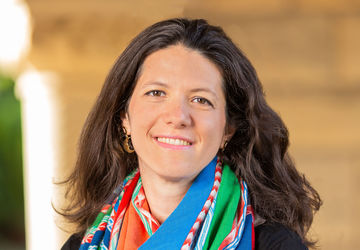“Not a Sprint, but a Relay Race:” Anita Hill’s Politics of Hope

Anita Hill’s voice is clear and familiar. “As a survivor of both behavioral and systemic failures, I believe that we can learn even from failed processes,” she said to a packed audience at the Clayman Institute for Gender Research’s annual Jing Lyman Lecture. “In fact, I have seen how the spectacle of failed processes can lead to social change,” she said. The Jan. 25 event was the first celebrating the Clayman Institute’s 50th anniversary year.
Many gathered in Stanford’s Hauck Auditorium were among the 30 million American households who watched as Hill testified to an all-male, all-white Senate Judiciary Committee in the 1991 confirmation hearings of Supreme Court Justice Clarence Thomas. Prior to the hearings, most Americans couldn’t define sexual harassment. “And they certainly didn’t know that this behavior in the workplace was against the law,” said Hill.
Hill’s testimony brought the pervasiveness of sexual misconduct into the national spotlight with unprecedented force, though the change in cultural tone was by no means immediate. “On October 12th, 1991, I left Washington and soon found out that 7 out of 10 viewers believed my testimony had been invented,” she told the audience.

It’s not the 70 percent that captured Hill’s attention. “The 30 percent of those with whom my testimony resonated refused to be silent about what they had witnessed. They shifted the direction of the conversation.”
In the year that followed the hearings, the Supreme Court heard more sexual harassment cases in a single session than it had in its entire history. Complaints of sexual harassment registered by the U.S. Equal Employment Opportunity Commission increased by over 50 percent. Hill’s testimony, and those who recognized its legitimacy, would go on to set off cascades of procedural and cultural changes in workplaces across the country. Within a couple of years, public perception of Hill’s testimony also would change, with 70 percent believing her claims.
Thirty years later, Hill is still working to end gender-based violence and sexual misconduct. Today, she is an award-winning author and a professor of law, social policy, and women’s and gender studies at Brandeis University. The youngest of 13 children from a farm in rural Oklahoma, Hill received her J.D. from Yale Law School in 1980. She began her career in Washington, D.C., where she worked in private practice, and at the U.S. Education Department and Equal Employment Opportunity Commission. In 1989, Hill became the first Black person to be tenured at the University of Oklahoma College of Law.
Despite the progress Hill and others have fought for, she is aware that many see the state of gender and race politics in the United States today as grim.

After all, the chair of the 1991 Senate Judiciary Committee—who both berated Hill and allowed her unremitting and inappropriate berating—is now the president. A man found liable for sexual abuse, who has bragged about sexual harassment, is again running to become the next presidential nominee for the Republican party. Impunity for allegations of sexual predation lives on in the Court, evidenced in the testimony of Christine Blasey Ford during the 2018 confirmation hearings of Justice Brett Kavanuagh. Many in the audience, particularly Stanford students, face a reproductive justice climate more dire than those of their mother’s generation.
Hill is aware of the setbacks but not disillusioned. Though change is too slow and too incremental, Hill sees promise in the gender ratio of the Senate, the millions of young people who supported #MeToo, and the resulting 70 anti-harassment laws passed in 22 states across the country, many with bipartisan support, in the years following the #MeToo movement’s launch.
Hill sees her vision for gender and racial parity at the highest levels of government, along with ending gender-based misconduct, as essential to combatting what she described as the weakening of American democracy. “The recognition of sexual harassment laws and other legal protections encourages women’s workforce participation,” said Hill, and with it the exercising of women, transgender, and nonbinary people’s political voice. “If your country doesn’t have a balanced gender political representation, and you allow for gender-based violence, your nation is setting back progress.”
Born just two years after Brown vs. Board of Education to parents who lived through the height of the Jim Crow era, Hill’s personal and professional legacy makes her an authority on the long-term vision of social change in America. “I don’t look at the progress of the past 30 years as a higher measure of where we’ve come as a society,” Hill remarked, reminding us that the arc of change extends far beyond what a single moment in time can reveal about the state of a nation.
Equality, as she puts it, is “not a sprint or a marathon, but a relay race.” Having run many legs for the cause herself, Hill continues to pass the baton forward.
(All photos by Paige Parsons Photography)


